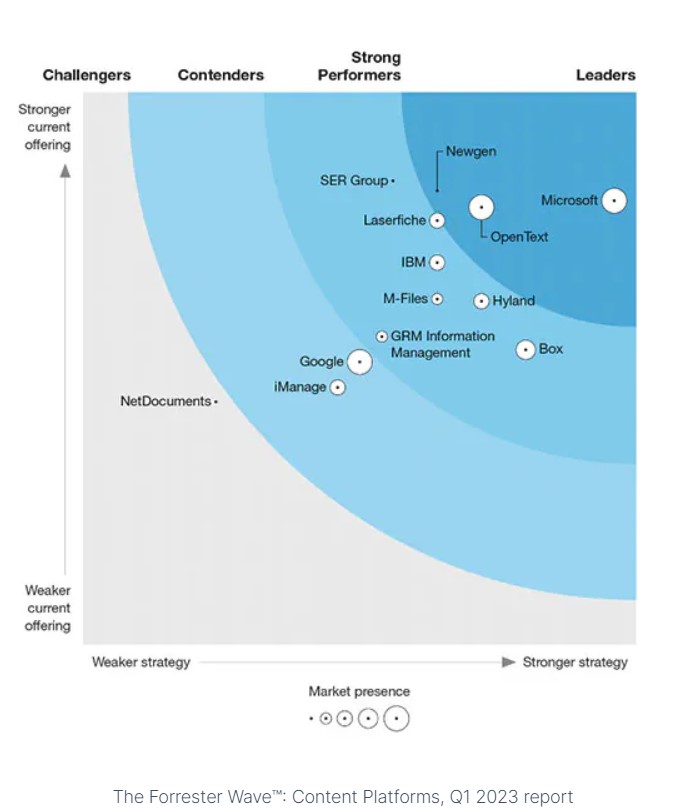Forrester Wave „Content Platforms“ 2023
27. März 2023 15:50 Uhr | Dr. Ulrich Kampffmeyer | Permalink

Das Analystenhaus Forrester hat eine neue Studie zum Thema Content Platforms herausgegeben, die bei verschiedenen der untersuchten Anbieter kostenfrei – gegen Hinterlassen der Kontaktdaten – heruntergeladen werden kann (z.B. bei OpenText OpenText Forrester Wave Q1 2023 Download).
Hauptautorin des Reports war wiederum Cheryl McKinnon, die bereits seit sehr langem in diesem Marktsegment tätig ist.
Zunächst fällt auf, dass im Titel der Studie nunmehr der Begriff „Services“ weggefallen ist. Früher sprachen Analysten wie Forrester und Gartner von Content Services und Content Services Platforms (CSPs). Bereits in ihrem ausführlichen Bericht „The Content Platforms Landscape, Q4 2022“ (https://www.forrester.com/go?objectid=res178416) wurde die neue Marktdefinition benutzt.
Forrester definiert „Content Platforms“ wie folgt:
<Zitat> „A software platform architected specifically for the design, development, and delivery of document-, content-, or process-rich applications. Content platforms enable the decoupling of repository, application, and user interface layers and reveal services and APIs for application creation and integration.“ </Zitat>
Im Prinzip handelt es sich also immer noch um die Branche runde um Enterprise Content Management, Content Services oder – IIM Intelligent Information Management. Dies zeigt auch die Liste der bewerten 13 Anbieter (Produktangebote direkt verlinkt): Box (Box Enterprise plus), Google (Google Workspace), GRM Information Management (VisualVault), Hyland (diesmal hier Alfresco Digital Business Platform), IBM (Cloud Pac for Business Automation; IBM Content Services SaaS on AWS), iManage (Work 10.4), Laserfiche (Laserfiche Cloud), M-Files (M-Files Cloud), Microsoft (M 365), NetDocuments (NetDocuments), Newgen (NewgenOne Contextual Content Services Platform), OpenText (OpenText Extended ECM) und SER Group (Doxis Intelligent Content Automation). Deutlicher Schwerpunkt sind Lösungen in oder aus der Cloud.
Für die Auswahl (eher für die Evaluierung zahlende Forrester-Kunden) und die Einschätzungen benutzte Forrester 26 Kriterien, gegliedert in die drei Bewertungsgruppen „Current Offering“, „Strategy“ und „Market Presence“, die sich in der Wave niederschlugen. Abgebildet sind dort die Positionierungen in Bezug auf das aktuelle Produktangebot (senkrecht) und die Strategie (waagerecht). Die Präsenz wird durch die Größe der Positionspunkte angegeben. Der aus Deutschland stammende Anbieter SER hat sich immerhin beim Produktportfolio eine hohe Positionierung erarbeiten können. Im Übrigen gibt es nur wenige Positionsverschiebungen im Vergleich zu den Vorjahren und anderer Studien. Microsoft hat sich mit ihrer Plattform weit nach oben und rechts, bei den „Leaders“, geschoben. OpenText immer noch weit oben und gut positioniert. IBM hält sich im Mittelfeld. Interessant wird es nun noch einmal durch Google, die ebenfalls in diesem Segment mitspielen (wollen).
Mit erheblichen Verschiebungen darf gerechnet werden, wenn sich erst Künstliche Intelligenz, Maschinenlernen, Robotic Process Automation und andere moderne Automatisierungs-Technologien im Feld der Content Plattforms-Anbieter bemerkbar machen. Hier wird sich dann auch zeigen, wie lange kleinere und mittlere Anbieter noch mithalten können.
Translation by Deepl.com
The analyst firm Forrester has published a new study on the subject of content platforms, which can be downloaded free of charge from various of the providers investigated – in return for leaving personal data (e.g. at OpenText OpenText Forrester Wave Q1 2023 Download).
The main author of the report was again Cheryl McKinnon, who has been working in this market segment for a very long time.
The first thing to notice is that the term „services“ has now been dropped from the title of the study. Previously, analysts such as Forrester and Gartner spoke of content services and content services platforms (CSPs). The new market definition was already used in their detailed report „The Content Platforms Landscape, Q4 2022“ (https://www.forrester.com/go?objectid=res178416).
Forrester defines „content platforms“ as follows:
<quote> „A software platform architected specifically for the design, development, and delivery of document-, content-, or process-rich applications. Content platforms enable the decoupling of repository, application, and user interface layers and reveal services and APIs for application creation and integration.“ </quote>
So, in principle, it is still the industry round about Enterprise Content Management, Content Services or – IIM Intelligent Information Management. This is also shown by the list of evaluated 13 vendors (direct links see above): Box (Box Enterprise plus), Google (Google Workspace), GRM Information Management (VisualVault), Hyland (this time Alfresco Digital Business Platform), IBM (Cloud Pac for Business Automation; IBM Content Services SaaS on AWS), iManage (Work 10.4), Laserfiche (Laserfiche Cloud), M-Files (M-Files Cloud), Microsoft (M 365), NetDocuments (NetDocuments), Newgen (NewgenOne Contextual Content Services Platform), OpenText (OpenText Extended ECM) and SER Group (Doxis Intelligent Content Automation). The clear focus is on solutions in or from the cloud.
For the selection (rather Forrester customers paying for the evaluation) and the assessments, Forrester used 26 criteria, divided into the three evaluation groups „Current Offering“, „Strategy“ and „Market Presence“, which were reflected in the Wave. The positions in relation to the current product offering (vertical) and the strategy (horizontal) are shown there. Presence is indicated by the size of the position points. SER, the provider from Germany, has at least been able to achieve a high positioning in the product portfolio. Otherwise, there are only a few position shifts compared to previous years and other studies. Microsoft has moved far up and to the right with its platform, among the „Leaders“. OpenText still far up and well positioned. IBM holds its own in the midfield. It is now becoming interesting once again due to Google, which also (want to) play in this segment.
Considerable shifts can be expected once artificial intelligence, machine learning, robotic process automation and other modern automation technologies make themselves felt in the field of content platform providers. This will also show how long smaller and medium-sized providers will still be able to keep up.
